Mark Anthony Neal's Blog, page 546
January 8, 2017
'Moonlight' Director Barry Jenkins: "I'm My Best Self on a Film Set"
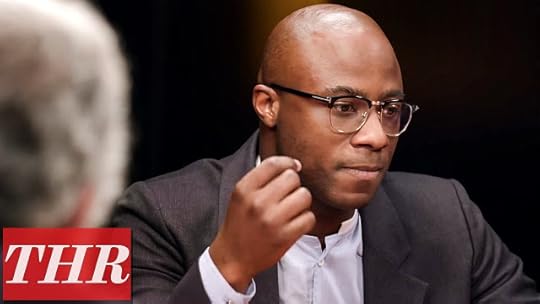 '"You walk on a set and you just have no idea. It's all possible" -- Barry Jenkins (Moonlight) is joined by 5 fellow directors for The Hollywood Reporter's Directors 2017 Oscars Roundtable including Oliver Stone (Snowden), Denzel Washington (Fences), Mel Gibson (Hacksaw Ridge), Mira Nair (Queen of Katwe), and Damien Chazelle (La La Land).' -- +The Hollywood Reporter
'"You walk on a set and you just have no idea. It's all possible" -- Barry Jenkins (Moonlight) is joined by 5 fellow directors for The Hollywood Reporter's Directors 2017 Oscars Roundtable including Oliver Stone (Snowden), Denzel Washington (Fences), Mel Gibson (Hacksaw Ridge), Mira Nair (Queen of Katwe), and Damien Chazelle (La La Land).' -- +The Hollywood Reporter
Published on January 08, 2017 14:43
Africa in Cuban Criollo Food
 'In this film short, Historian
Marco Polo Hernández Cuevas
explores the West African influence of Cuban "Criollo" cuisine-gastronomy.'
'In this film short, Historian
Marco Polo Hernández Cuevas
explores the West African influence of Cuban "Criollo" cuisine-gastronomy.'
Published on January 08, 2017 14:35
What Does It Mean to Be Southern?: Artist Radcliffe Bailey on the 'Global' American South
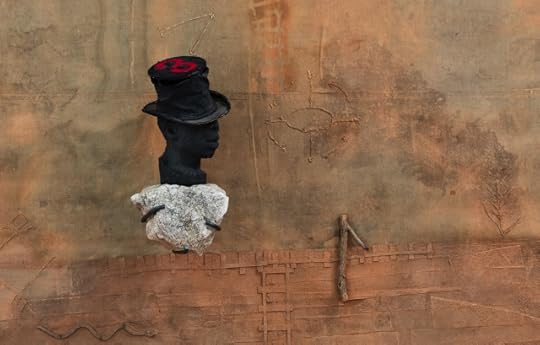 'What does it mean to be southern? In this episode of Nasher Museum: Open Studio artist Radcliffe Bailey talks about his global approach to the American South. Bailey is one of 60 artists in the exhibition Southern Accent: Seeking the American South in Contemporary Art.' -- +Nasher Museum
'What does it mean to be southern? In this episode of Nasher Museum: Open Studio artist Radcliffe Bailey talks about his global approach to the American South. Bailey is one of 60 artists in the exhibition Southern Accent: Seeking the American South in Contemporary Art.' -- +Nasher Museum
Published on January 08, 2017 09:46
January 6, 2017
From Bert Williams to “Strange Fruit”: Race and The Inauguration
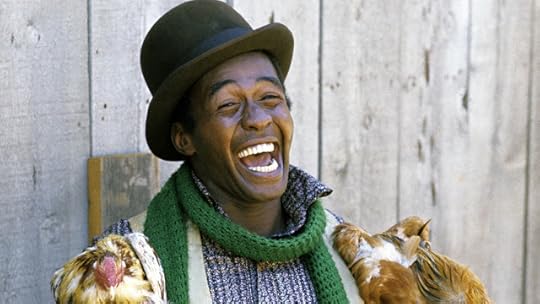 Ben Vereen as "Chicken George" in Roots (1977)From Bert Williams to “Strange Fruit”: Race and The Inaugurationby Mark Anthony Neal | @NewBlackMan | NewBlackMan (in Exile)
Ben Vereen as "Chicken George" in Roots (1977)From Bert Williams to “Strange Fruit”: Race and The Inaugurationby Mark Anthony Neal | @NewBlackMan | NewBlackMan (in Exile)Rebecca Ferguson’s recently announced that she would accept an invitation to perform at Donald Trump’s Inauguration, with the caveat that she be allowed to sing the classic anti-lynching anthem “Strange Fruit.” Ferguson’s decision recall a similar decision almost 40 years ago by Black celebrity, to perform at the inauguration of a another hugely unpopular President among Black audiences.
In January of 1981 and at the peak of his career, actor, singer and dancer Ben Vereen was asked to perform at an inaugural celebration for Ronald Reagan. With a successful career on the stage, winning a Tony Award for Pippin in 1973, Vereen become a household name on the strength of his role as Chicken George, grandson of Kunte Kinte, in the ground-breaking mini-series Roots (1977). With access, perhaps, to his greatest stage, Vereen chose to pay tribute to America’s first Black cross-over artist, Bert Williams.
Williams, who was the first African-American to have a starring role for the famed Ziegfeld Follies in 1910, and who with partner George Walker, once labeled their minstrel act as “two real coons,” is today the most well-known Black-face minstrel. Born in the Bahamas in 1874, Williams’s ability to perform so-called “authentic” Black American culture, made him a major star. With his mainstream success, Williams paved the way for generations of Black stage and movie performers, though the Blackface minstrelsy that was his vehicle is often looked back on with disdain and shame.
It was perhaps such shame that Vereen was hoping to address, when he began performing tributes to Williams in the early 1970s. As Vereen told the Los Angeles Times in 1975, “I’m dealing with cleaning up Black history—the uncle Tom/coon era. Bert was one of the highest paid vaudevillians, yet he couldn’t share a dressing room with a white man.” Given his history of portraying Williams, Vereen probably thought nothing about the performance as he stepped on stage that evening in January of 1981, even as Black leaders had already dubbed the Reagan presidency as the beginning of a new nadir of the Civil Rights period.
As part of his performance, Vereen began with an introduction that explained the indignities that Williams faced, including the task of putting charcoal on his face on a nightly basis, in order to be transformed into the “darky” that White Americans—and quite a few Black Americans—found so alluring. Unfortunately, when Vereen’s performance was aired by CBS, the introduction was edited out. As Camille Forbes, author of Introducing Bert Williams: Burnt Cork, Broadway, and the Story of America’s First Black Star, describes the performance, “the appearance included only an image of Ben Vereen, a black man, seemingly shuffling and dancing in blackface.”
Negative reaction to Vereen’s performance was relatively swift, this in the era before 24-hour news coverage and with no #BlackTwitter to drag him. Noted Black journalist Williams Raspberry queried in the Washington Post, “What sort of commentary was this on the prospective relationship between black America and the Reagan administration?...Didn’t Ben Vereen in particular understand the hazard implicit in re-awakening this shameful stereotype?” Earl Calloway, writing in the Pittsburgh Courier was less diplomatic: “last night’s performance was a devastating blow to the progress of social and economical equality which black Americans have received in entertainment.”
The controversy speaks to the ways that the images of Blackness are intimately related to how Black Americans feel about their political realities. Vereen had previously performed his Bert Williams tribute for Presidents Jimmy Carter and Gerald Ford without much comment, but the election of Ronald Reagan in 1980 raised the stakes associated with the circulation of so-called negative stereotypes.
For his part Vereen, was clear about his intent, telling The Washington Post, “I was trying to say that Blackness didn’t start with The Supremes. I was trying to show a part of our history that needs to be seen and heard. I am very proud of my heritage.” Vereen also wanted to bring the brilliance of Williams back from obscurity. As he told television host Tony Brown, many audiences simply didn’t know he was paying tribute to a Black man, as many only recalled the Blackface minstrelsy of the White performer Al Jolson.
Ferguson, with her offer, seemingly wanted to call President-elect Trump’s bluff. “Strange Fruit,” a song written by Abel Meeropol, was a linchpin of Black (and Progressive White) resistance to anti-Black violence in the South. Billie Holiday’s performance of the song -- like “God Bless the Child,” it became one of her signature tunes -- made her a target of the Surveillance State, with risks associated, that have faced since The significance of the song will likely be lost on most in attendance at Mr. Trump’s inauguration, yet it is a reminder of a long tradition of such resistance in the arts.
In his own way Bert Williams was emblematic of that resistance, attempting to fuse his Blackface performance with a sense of Black humanity (inclusive of the humorous aspects of Black life) and indeed, Vereen’s gesture 36 years ago, however misinterpreted, was an attempt to do the same for Williams and Black America.
Published on January 06, 2017 20:09
Rethinking Slavery in the 21st Century: Representing Slavery in American Culture
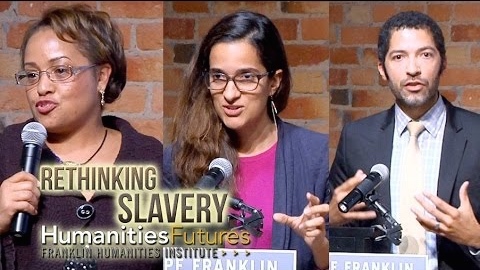 'This one and half-day symposium examined the archival and popular representation of chattel slavery, as altered by the cultural and technological transformations of the 21st century. This panel featured Mary Elliot, Museum Specialist, Smithsonian Institution’s National Museum of African American History and Culture; Ellen Scott, Associate Professor, Director and Chair, Moving Image Archives Studies, UCLA; Matthew Delmont, Professor, Arizona State University.' +Duke Franklin Humanities Institute
'This one and half-day symposium examined the archival and popular representation of chattel slavery, as altered by the cultural and technological transformations of the 21st century. This panel featured Mary Elliot, Museum Specialist, Smithsonian Institution’s National Museum of African American History and Culture; Ellen Scott, Associate Professor, Director and Chair, Moving Image Archives Studies, UCLA; Matthew Delmont, Professor, Arizona State University.' +Duke Franklin Humanities Institute
Published on January 06, 2017 18:31
Chris Emdin: Why are There So Few Black Male Teachers?
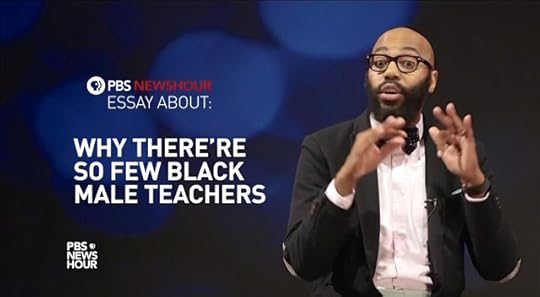 'Why are there so few black male teachers? Chris Emdin of Columbia University suggests that a cycle of failure haunts students and their teachers. Students act out, so teachers tighten the rules; more restrictions combined with dull and irrelevant curricula cause students to fail, and teachers quit -- thinking it’s their fault. Emdin raps his Humble Opinion on why the system needs to be changed.' -- +PBS NewsHour
'Why are there so few black male teachers? Chris Emdin of Columbia University suggests that a cycle of failure haunts students and their teachers. Students act out, so teachers tighten the rules; more restrictions combined with dull and irrelevant curricula cause students to fail, and teachers quit -- thinking it’s their fault. Emdin raps his Humble Opinion on why the system needs to be changed.' -- +PBS NewsHour
Published on January 06, 2017 18:21
How Mothers Explain Racism to Their Children
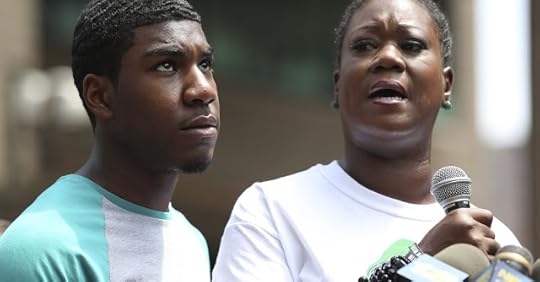 '
April Ryan
, veteran journalist, host and Washington Bureau Chief for American Urban Radio Networks (AURN), discusses her latest book,
At Mama’s Knee: Mothers and Race in Black and White
. She looks at themes of race and intolerance through the lessons that she taught her children as a single, African American mother in Baltimore. She interviews other mothers, including political leaders like Hillary Clinton, Valerie Jarrett, in addition to women like Sybrina Fulton, Trayvon Martin’s mother, whose lives have been affected by race related events.' -- Leonard Lopate Show
'
April Ryan
, veteran journalist, host and Washington Bureau Chief for American Urban Radio Networks (AURN), discusses her latest book,
At Mama’s Knee: Mothers and Race in Black and White
. She looks at themes of race and intolerance through the lessons that she taught her children as a single, African American mother in Baltimore. She interviews other mothers, including political leaders like Hillary Clinton, Valerie Jarrett, in addition to women like Sybrina Fulton, Trayvon Martin’s mother, whose lives have been affected by race related events.' -- Leonard Lopate Show
Published on January 06, 2017 18:10
January 5, 2017
Gender + Race + Fembots in 'Westworld'
 'On this segment of Popaganda, poet and scholar Margaret Rhee discusses the race and gender dynamics of hit HBO series Westworld.' -- +Bitch Media
'On this segment of Popaganda, poet and scholar Margaret Rhee discusses the race and gender dynamics of hit HBO series Westworld.' -- +Bitch Media
Published on January 05, 2017 17:43
The Later King by Charles Bane, Jr.
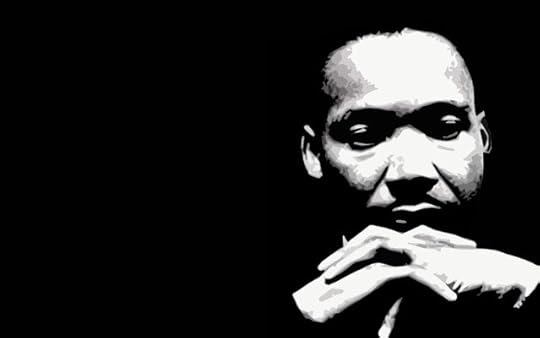 The Later Kingby Charles Bane, Jr. | NewBlackMan (in Exile)
The Later Kingby Charles Bane, Jr. | NewBlackMan (in Exile)The televised violence that spilled into the streets, the clash of wills, and the adherence to a strategy that would result in tangible gains in civil rights for African Americans to a degree that would amount to Reconstruction consumed the life of Martin Luther King, Jr., who accepted that its tumult had caught him up like a slave catcher and would cost him his life. There was no doorway to escape and he met his fate with egoless steadiness, humor and an extraordinary physical courage.
But it was not the life he had mapped out, and his martyrdom should not blind us to the later life where me might have returned to himself as an individual and adopt a life more true to himself and where his gifts would nave bedazzled us.
This year he would be eighty- eight years old, and if still alive there would have been a vast space of time following his retirement from activism for him to construct a whole theology that would startle an America obsessed with questions about our personal faith.
A Guggenheim Fellowship would give him the financial security to pursue his studies. This was exactly the life led by the Dutchman Erasmus in the fifteenth century who found the patrons to support him so that Erasmus could find a modest house with shaded garden, where he could gather books and manuscripts and master ancient Greek and Latin and a smattering of Hebrew in his heroic effort to find the kernel of compassion in all Christianity and translate the New Testament anew.
King would have been sought out as a scholar in residence by the finest divinity schools in the country, but it is impossible to believe he would have chosen other than his first first home of study, Crozer Theological Seminary, now in Rochester, New York. King, traveling countless miles and staying in numberless motel rooms during the civil rights era, would have sighed with relief at returning to any place that symbolized permanency.
"I forgive you.", the survivors of the Charleston church shooting said one after another said to Dylan Roof. It is in the practice of Christianity by Black America that King would have based a translation of the New Testament that burrowed into the soul of his People whose Christianity is its core identity: pacifist, socially- minded, non-violent, accepting of strictures that are the bedrock of their daily lives.
The reading of a Bible depends, still today, on the quality of its sources and the clear, lively heart of he/she who interprets it. To many American Jews, Everett Fox's translation of the Five Books of Moses is a seminal work ( the translation was Fox's life's task) that restores the Old Testament as an accurate, eerily immediate document that gives to the reader a sense of cultural belonging).
This, without doubt, would have been King's joy and the culmination of all his life's twists and turns. For anyone with eyes, the faith of Black America is more profound than any denomination, more willing to be charitable, more strict with transgression. And in Written Word, Martin Luther King, Jr. would have captured its voice.
+++
Charles Bane, Jr. is a published poet and second-generation civil rights activist.
Published on January 05, 2017 17:03
You Don’t Call the Police on Poverty by Lamont Lilly
 You Don’t Call the Police on Povertyby Lamont Lilly | @LamontLilly | NewBlackMan (in Exile)
You Don’t Call the Police on Povertyby Lamont Lilly | @LamontLilly | NewBlackMan (in Exile)I arrived at the Durham Co-op Market Monday morning January 02, 2017 for coffee and to finish some writing. As I approached the market’s front door, a middle-aged Black man standing on the side of the building stopped me and asked for “spare change.” Little did he know, I was four days from ‘pay day’ and had absolutely no money. I was living on a credit card for the next four days. I told him I was out of cash and kept walking.
As I entered the sliding glass doors, one of the cashiers asked, “Is that man still out there asking for money?” I said “Yes, but he’s not posing a threat to anyone. He’s just standing on the side, asking for spare change.” She then informed me that she had already spoken with him once that morning and that the manager had instructed her to call the police.
I said, “Sis, please do NOT call the police. You call the police and that man could lose his life just for asking people for ‘spare change’ this morning.” There were customers standing in line, but I was very adamant about not calling the police, because as I shared with her “that’s exactly how Black lives become hashtags.”
In reality, she was really just doing her job, as she was told. My job, however, was to speak up for the poor (and possibly, to save that man’s life). The LAST thing we need here in Durham is another Frank Clark or Jesus Huerta . I said “Look, don’t call the police. I’ll go out there and talk to him.” So I did.
I walked out by the dumpster and said “Yo, Bro. They’re about to call the police on you. I’m sorry, but you can’t stand over here.” I suggested he switch location to the convenience store across the street. He said “Nah, man. I can’t.”
I apologized to him for not having anything to give, except the 72 cents that was buried among lint in my right front pocket. When I reached out to give him spare change, he said “Brother, I don’t want to do this. I used to be a working man. I still have my pride, you know. My VA (Veterans Affairs) check doesn’t get here until the 5th. I’m only asking for spare change because this is the only option I have right now. I tried to get a job in there, and other places around here, too. No one’s hiring homeless Black veterans right now.”
I shared with him how I too was homeless at one time – slept in my car for a week before Camryn and Earnest Smith, thankfully, opened up their home to me while their daughter was away in college. I informed him that I too was a veteran, and someone who had been charged with a felony.
I know exactly how it feels to be denied employment opportunities, even with a college degree. I know exactly how it feels to depend on “favor and goodwill.” I know how it feels to be hungry, too. Like hell! People look at you like you’re ‘less than human.’ Mind you, I was a college graduate who could actually articulate myself and be halfway charming. A lot of folk will feed hungry dogs before they feed hungry people, especially homeless Black people.
I went inside the market and fixed him a warm to-go plate of stewed chicken, beans and rice, cabbage, and a half sweet potato. I asked if he wanted to come inside and sit down with me, but he was worried that he might be recognized. I insisted again, but realized the best thing to do was to respect his concern. I brought the food out, and fought back my tears.
For those who think poor people are “lazy” and do not want to work, please, stop! When you live in poverty , each and every day is “hard work.” The hustle. The grind. The mental and emotional strain, just to eat. Trust me, I can tell you from personal experience, there’s nothing “lazy” about surviving poverty, especially when you’re a descendant of the same people whose free slave labor was responsible for building this empire.
Poor people are not stupid. They’re not criminals. They’re not “welfare queens.” They’re not any of those things. They’re human beings that live in a society where jobs are drying up and opportunities can, sometimes, be non-existent.
With all of the new ‘gentrification’ money that’s here in Durham now, there has to be something that we can do for poor folk besides criminalize them. You don’t call the police on someone because they’re poor. You ask them how you can help and be a blessing.
+++
Lamont Lilly was the 2016 Workers World Party, Vice-Presidential Candidate. In 2015 he was an Indy Week “Citizen Award” winner for his activism and journalism. Follow him on Twitter @LamontLilly.
Published on January 05, 2017 16:23
Mark Anthony Neal's Blog
- Mark Anthony Neal's profile
- 30 followers
Mark Anthony Neal isn't a Goodreads Author
(yet),
but they
do have a blog,
so here are some recent posts imported from
their feed.



